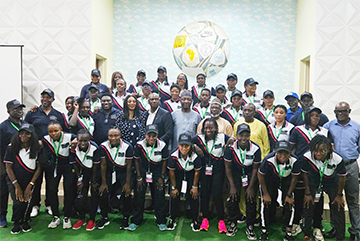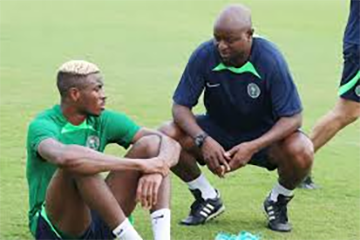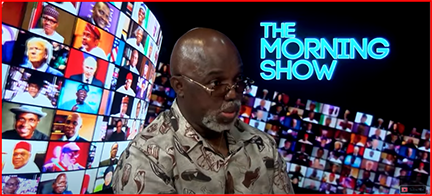Nigerian Football
Eye Witness Account with PHOTOS: How Okwaraji, Five Fans Died
BY KUNLE SOLAJA.
The August 12, 1989 Italia ’90 World Cup qualifying match with Angola could had just been another match day. But it is now ever recalled, not for the result, which was favourable to Nigeria at least in the short run, but for the bizarre happenings.
It was just a day to the 10th anniversary of a previous disaster that claimed 24 lives at the National Stadium, Lagos.
Nigeria desperately needed to win the tie against Angola to be in contention of leading a World Cup qualifying group that also had Gabon and Cameroon.
The result of the penultimate match in Gabon which Nigeria against formbooks had lost 1-2 made the August 12, 1989 match the more important.

- Hon. Nduka Irabor and some members of the Nigerian Football Supporters’ Club helping the fainted fans into an ambulance.
Besides, it was to be the first match after a long closure of the National Stadium, Lagos which was undergoing upgrading for an anticipated hosting of the then World Youth Championship (now u-20 World Cup) in 1991.
Nigeria had had to play their home matches at the low-capacity Lekan Salami Stadium, Ibadan until the National Stadium, Lagos was reopened.
Expectedly, the stadium was jam-packed for a teeming crowd that appeared to have been starved for close to two years that the stadium had been closed for refurbishment.
The crowd thronged the 40,000 capacity stadium, filling it nearly 20,000 over. About 4,000 others were stranded outside, making rounds to the 12 ramps leading into the main- bowl.
Announcements blared from the public address system directing the crowd outside to gates D, E and F leading to the southern pavilion at the Lagos end of the field. Gates had been opened nearly seven hours to kick off.
The spectators’ stands were overfilled, resulting in jostling and pushing, chokes, suffocation, exhaustion and soon, deaths! Moments before kick-off, some of the spectators around the covered terraces began to faint in ones and twos.

- Efforts to revive the fans yielded no result

- One after the other, they died
Few people might have noticed the unusual incident of an ambulance moving on the just refurbished tartan tracks to convey the fainted fans after efforts at reviving them by medical personnel had failed.
Then another ambulance came again. Ambulance movements became a common sight. The stadium’s clinic with only three beds became jam-packed with unconscious people.
Medical personnel said there were so many of them and they had to be treated on the bare floor. Fifteen of them had to be taken to the General Hospital in Lagos.

- Journey to the morgue begins
One Mutiu Salami, a 14-year old victim who was rushed to the General Hospital and regained consciousness three days later narrated his experience: “As the match drew to an end, everybody was rushing. They rushed me and I fell down. The next thing I knew was finding myself at the hospital”.
He was lucky. It was more disastrous for others. Five of them died. Niyi Mosuro, a 15- year-old schoolboy from Ijebu-Ode was one of the victims identified. August 12, 1989, was the first time he would watch a football match at the National Stadium.
It was the last day he lived. Wale Mosuro, his uncle, said Niyi was not quite a football enthusiast. His body was discovered in the morgue. Others identified were bodies of Shehu Tijani and Okorie Agwu.
Everything went awry that sunny August 12, 1989. Sad incidents that would catch worldwide attention were unfolding. From the sidelines, five football fans were suffocated to death. Football, a national passion, overnight turned a national horror.
The standard of soccer in the Nigeria-Angola match fell below expectation even though both teams paraded a pack of tested professionals. Tackling was rough. Each side lost a penalty kick. Austin Eguavoen lost that of Nigeria.

- A caution from the referee, which in a twist of fate was a ‘red card’ from life. This is the last known photograph of Okwaraji alive. His first match at the Lagos National Stadium turned the last time he played and lived.
But the biggest disaster of the day was imminent. As the drab match progressed, an Angolan player slumped.
Medical personnel rushed to administer treatment. It was barely 10 minutes to the end of the match. As attention focussed on the injured player, and while some fans that had fainted by the sidelines were being attended to, the unexpected happened.
Dreadlocks haired Samuel Okwaraji, the Nigerian bubbling mid-field maestro, collapsed and fell face down. Few people would have thought it was mere exhaustion.
“We all thought he merely fainted and that he was going to recover,” Etim Esin, a teammate, remarked the following day at the then Durbar Hotel (now Golden Tulip, Festac Town) abode of the team.

- The moment Okwaraji slumped…
The nearest player to Samuel Okwaraji, Samson Siasia, rushed to the prostrate form and tried him to face up. What he saw was frightening as he put his hands on his head in despair.
“The way I saw him, he was gasping and foaming. His teeth were gritty… No one could easily ascertain the cause of his death. It still remains a mystery.
But one of the doctors that first attended to him told this reported that Samuel Okwaraji died “very fast”. He may have died on the pitch.
Nigerian Football
Nigerian women coaches conclude first module of CAF C-License course

A total of 30 women coaches have concluded the first of a three-module CAF C-License program in the Federal Capital, Abuja and are expected to commence a two-week internship with different teams in a few days.
Peopled largely by former Nigerian internationals and other serving coaches, the group was taken through a full week of rigorous classroom and practical sessions by a team of coach educators and resource persons, in a baptism of what the next two modules are likely to entail,
NFF Technical Director, Coach Augustine Eguavoen, told thenff.com that the first module has shown that the women coaches are actually desirous of learning.
“I am very much impressed with their attitude, mannerisms and conduct through the first module. They impressed everyone, and the coach educators also told me they were impressed, and are looking forward to having them back for the second and concluding modules.
“We are grateful for the leadership of the NFF for the support and encouragement for coach-education programmes all the time.”
The participants will return to Abuja for the second module that is scheduled for 12th – 20th August, after which they will go on another two-week internship, 23rd August – 4th September. The third module, which comes with examinations for the participants, will take place 9th – 19th September.
Dr. Terry Babatunde Eguaoje, NFF’s Head of Education, is among the coach educators’ team, which also includes Coaches Isah Ladan Bosso, Wemimo Olanrewaju and Lanrence Ndaks.
Among the 30 participants are former Super Falcons’ stars Precious Dede, Joy Jegede, Esther Michael, Maureen Eke, Otas Ogbonmwan, Vera Okolo, Cecilia Nku, Taiwo Ajobiewe, Gloria Ofoegbu and Amenze Aighewi. There are also Barr. Victoria Nlemigbo and retired FIFA referee Folusho Ajayi.
Nigerian Football
Osimhen’s outburst was a moment of madness, says Amaju

Former Nigeria Football Federation (NFF) President and a FIFA Council member, Amaju Pinnick has expressed shock at last month’s outburst by Super Eagles’ striker, Victor Osimhen against Finidi George.
“It is very unfortunate”, Amaju Pinnick remarked on an Arise Television programme. The former NFF president said he had put a call to Osimhen who was very remorseful while the telephone conversation lasted.
“I told him he has to apologise, and I am sure he will if he has not yet done so.” Amaju remarked that he could not comprehend what went wrong as Osimhen was the most cool-headed player in the national team.
He went on to remark that Finidi George was not a personality to be disregarded like that. He has won virtually every honour available during his playing days and was a member of the Super Eagles at their peak when Nigeria ranked fifth in the world.
“I believe players should learn to respect their coaches”, said the former NFF boss.
Nigerian Football
I prefer a foreign coach for the Super Eagles, says Amaju

Nigeria’s FIFA Council member, Amaju Pinnick has told the world that he has always been an advocate of foreign coaches for the Super Eagles. He spoke on Arise Television while fielding questions with Reuben Abati, Rufai Oseni and Ayo Mairo-Ese.
His reason for being averse to indigenous coaches stemmed from lack of respect for them by the players.
“Yes, the Nigerian coaches have the requisite knowledge and the technical ability, but modern football is beyond that in managing players.
“Will the national team players respect the coach? The sad thing is that they don’t”, said Amaju Pinnick.
He however revealed that he supported the appointment of Finidi George owing to the circumstances that the NFF found itself after the exit of Jose Peseiro.
The NFF, he revealed, had no money to hire a foreign coach. The body therefore went for the most available option, Finidi to ensure a smooth transition.
“Finidi was part of the coaching crew of Peseiro and it was therefore logical to ask him to continue.
-

 Nigerian Football1 week ago
Nigerian Football1 week agoI prefer a foreign coach for the Super Eagles, says Amaju
-

 Olympics5 days ago
Olympics5 days agoBrazilian women train in Zidane’s birthplace ahead of Nigeria Super Falcons clash
-

 Premier League1 week ago
Premier League1 week agoNigerian-born Man United’s new striker promises creativity and unpredictability to fans
-

 Olympics11 hours ago
Olympics11 hours agoThis is my story: Odegbami on how he is stranded in London
-

 Nigerian Football1 week ago
Nigerian Football1 week agoOsimhen’s outburst was a moment of madness, says Amaju
-

 Olympics6 days ago
Olympics6 days agoTeams plan for lack of toilets on Paris opening ceremony barges
-

 OBITUARY1 day ago
OBITUARY1 day agoBREAKING! Former Heartland FC owner, Iwuanyanwu, dies at 81
-

 Olympics4 days ago
Olympics4 days agoSuper Falcons’ opponent, Brazil’s Marta and 3 Africans listed among 10 footballers to watch at Paris 2024


